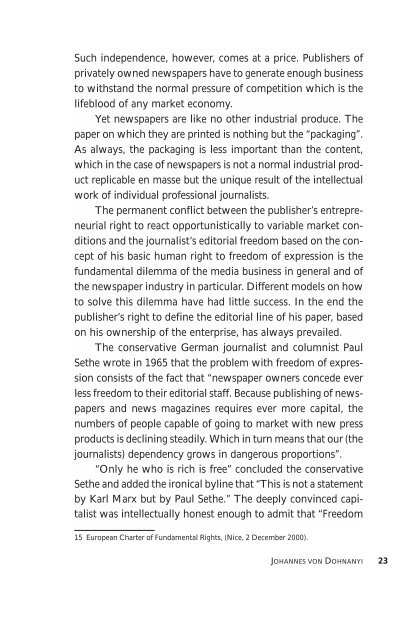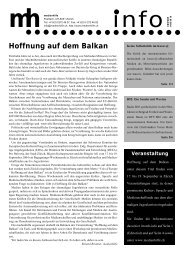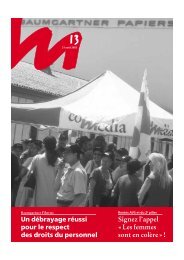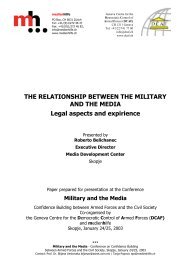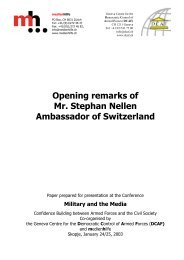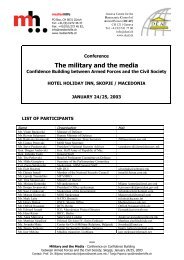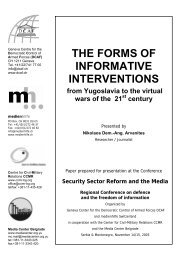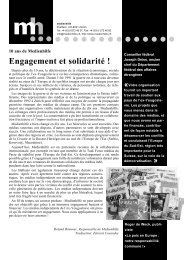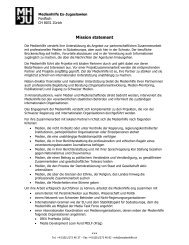The Impact of Media Concentration on Professional ... - OSCE
The Impact of Media Concentration on Professional ... - OSCE
The Impact of Media Concentration on Professional ... - OSCE
Create successful ePaper yourself
Turn your PDF publications into a flip-book with our unique Google optimized e-Paper software.
Such independence, however, comes at a price. Publishers <str<strong>on</strong>g>of</str<strong>on</strong>g>privately owned newspapers have to generate enough businessto withstand the normal pressure <str<strong>on</strong>g>of</str<strong>on</strong>g> competiti<strong>on</strong> which is thelifeblood <str<strong>on</strong>g>of</str<strong>on</strong>g> any market ec<strong>on</strong>omy.Yet newspapers are like no other industrial produce. <str<strong>on</strong>g>The</str<strong>on</strong>g>paper <strong>on</strong> which they are printed is nothing but the “packaging”.As always, the packaging is less important than the c<strong>on</strong>tent,which in the case <str<strong>on</strong>g>of</str<strong>on</strong>g> newspapers is not a normal industrial productreplicable en masse but the unique result <str<strong>on</strong>g>of</str<strong>on</strong>g> the intellectualwork <str<strong>on</strong>g>of</str<strong>on</strong>g> individual pr<str<strong>on</strong>g>of</str<strong>on</strong>g>essi<strong>on</strong>al journalists.<str<strong>on</strong>g>The</str<strong>on</strong>g> permanent c<strong>on</strong>flict between the publisher’s entrepreneurialright to react opportunistically to variable market c<strong>on</strong>diti<strong>on</strong>sand the journalist’s editorial freedom based <strong>on</strong> the c<strong>on</strong>cept<str<strong>on</strong>g>of</str<strong>on</strong>g> his basic human right to freedom <str<strong>on</strong>g>of</str<strong>on</strong>g> expressi<strong>on</strong> is thefundamental dilemma <str<strong>on</strong>g>of</str<strong>on</strong>g> the media business in general and <str<strong>on</strong>g>of</str<strong>on</strong>g>the newspaper industry in particular. Different models <strong>on</strong> howto solve this dilemma have had little success. In the end thepublisher’s right to define the editorial line <str<strong>on</strong>g>of</str<strong>on</strong>g> his paper, based<strong>on</strong> his ownership <str<strong>on</strong>g>of</str<strong>on</strong>g> the enterprise, has always prevailed.<str<strong>on</strong>g>The</str<strong>on</strong>g> c<strong>on</strong>servative German journalist and columnist PaulSethe wrote in 1965 that the problem with freedom <str<strong>on</strong>g>of</str<strong>on</strong>g> expressi<strong>on</strong>c<strong>on</strong>sists <str<strong>on</strong>g>of</str<strong>on</strong>g> the fact that “newspaper owners c<strong>on</strong>cede everless freedom to their editorial staff. Because publishing <str<strong>on</strong>g>of</str<strong>on</strong>g> newspapersand news magazines requires ever more capital, thenumbers <str<strong>on</strong>g>of</str<strong>on</strong>g> people capable <str<strong>on</strong>g>of</str<strong>on</strong>g> going to market with new pressproducts is declining steadily. Which in turn means that our (thejournalists) dependency grows in dangerous proporti<strong>on</strong>s”.“Only he who is rich is free” c<strong>on</strong>cluded the c<strong>on</strong>servativeSethe and added the ir<strong>on</strong>ical byline that “This is not a statementby Karl Marx but by Paul Sethe.” <str<strong>on</strong>g>The</str<strong>on</strong>g> deeply c<strong>on</strong>vinced capitalistwas intellectually h<strong>on</strong>est enough to admit that “Freedom15 European Charter <str<strong>on</strong>g>of</str<strong>on</strong>g> Fundamental Rights, (Nice, 2 December 2000).JOHANNES VON DOHNANYI 23


